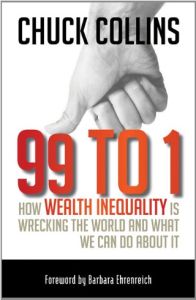Join getAbstract to access the summary!

Join getAbstract to access the summary!
Chuck Collins
99 to 1
How Wealth Inequality Is Wrecking the World and What We Can Do About It
Berrett-Koehler, 2012
What's inside?
How can we keep 1% of the population from running the world? Or do they already?
Recommendation
Chuck Collins, a senior scholar at the Institute for Public Policy and the co-author of several books on social disparity, examines the overall scope of wealth inequality. He offers a history of how today’s economic situation evolved, makes an impassioned plea for deflating the superrich and provides a political prescription for economic equality. Collins occasionally indulges in over-the-top phrasing – for example, “the inequality death spiral.” This shows his genuine passion about the massive issue of wealth inequality, but perhaps he would be even more persuasive without the rhetorical flourishes. getAbstract recommends Collins’s book, even to those who may disagree, as an important portrait of crucial economic issues.
Summary
About the Author
Chuck Collins is the author or co-author of several books on economic inequality including Economic Apartheid in America with Felice Yeskel and Wealth and Our Commonwealth with Bill Gates Sr.


















Comment on this summary